UPDATE: More information on the goal of Kaiser-Jeep’s 1966 Eastern European Caravan. This article was published on page 7 of the May 14, 1966, issue of International Commerce, a US Department of Commerce Weekly magazine. In it, the Commerce Department’s ostensible goal was as an “imaginative technique to promote U.S. Exports”, as part to the U.S. Government’s continuing effort to promote East-West Trade. It’s possible the trip was underwritten in some form (cash or government favors or both) to encourage Kaiser-Jeep to participate.
=========================
This September 1966 Four Wheeler Magazine article describes the scene when the Kaiser-Jeep sponsored Eastern European Caravan crossed into (then) Czechoslovakia, as a line of restored and refurbed jeeps awaited them. Remember, that no new parts had even available to these die-hard jeep fans since 1946, making their rebuilds even more remarkable. The Prague Jeep Club alone had more than 300 jeeps and 400 members.
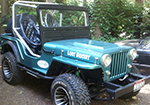
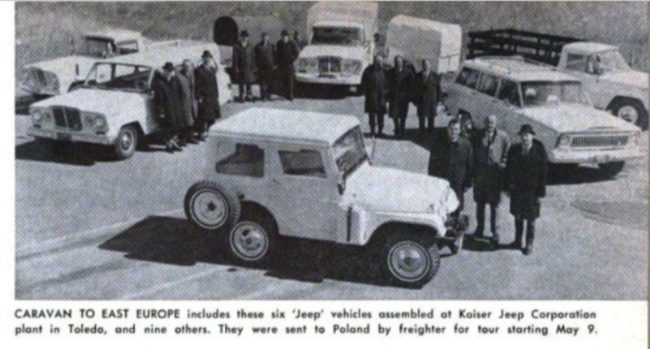

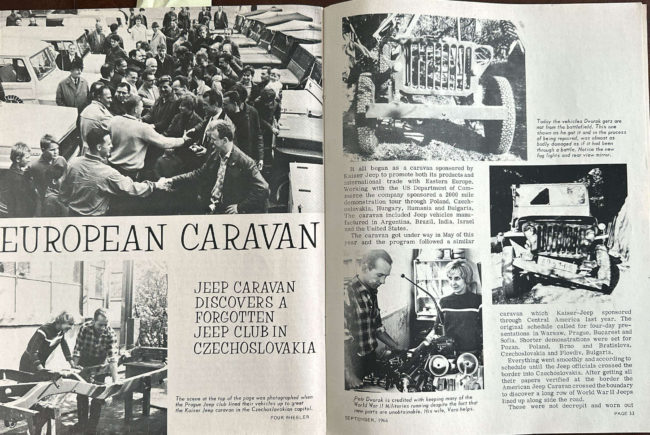
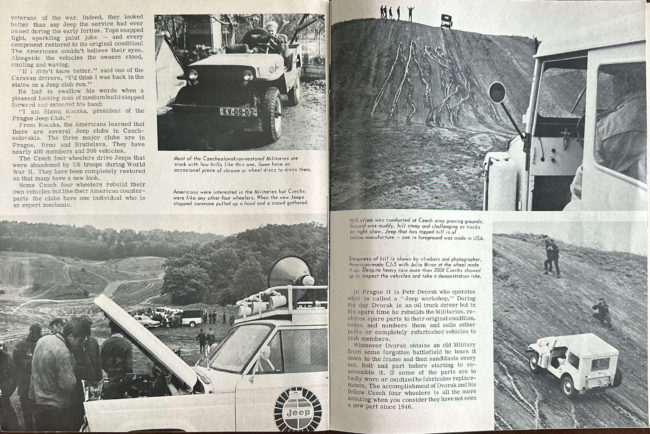
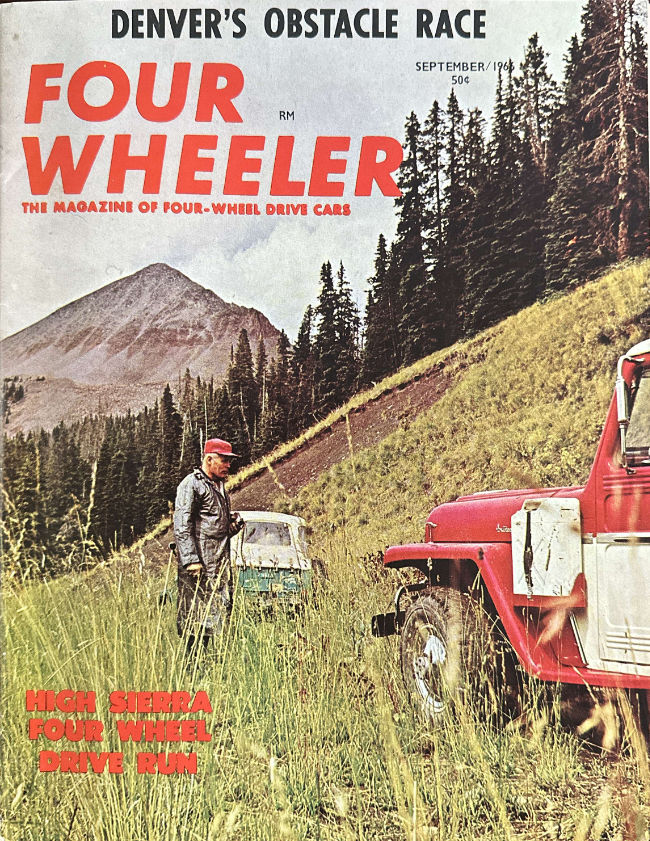
What’s surprising about this story, is the fact that the United Stated Government supported this effort to encourage east – west trade. During this era of the “cold war” the common belief was that the Russians can’t be trusted, yet here we are, giving them a perfect opportunity to copy cat Kaiser Jeep 4 wheel drive engineering. How could this possibly benefit Kaiser? This is mind boggling, when you look at Communist Russian vehicles with the oblivious poor quality of that era, How could this be seen as a positive effort by the United States & Kaiser Jeep?
Mike, Don’t know for sure, but this probably all ended with the Russian invasion of Czechoslovakia in 1968.
(We had conveniently forgotten about their invasion of Hungary in the 50s).
It’s all about money. The same way we rush to have the Red Chinese make our aftermarket Jeep parts and pay dearly in both quality and proprietary loss. They are now themselves flooding the internet with multiple listings of the same products at slave-labor prices. We are constantly fighting off their agents attempting to purchase products we make to copy and add to those bargain basement listings and put us out of business.
Originally said by the Soviet’s Lenin, “The capitalists will sell us the rope with which to hang them.”
I’m no expert in Cold war Eastern Bloc history, but as I understand it, people in countries like Poland and Czechoslovakia had a bit more freedom than the typical Russian.
They were free for a while after the end of the war, were closer to the U.S. wartime combat zones (compared to Russia), so I can see some surplus material getting into the hands of regular people there.
So a farmer or car enthusiast could have gotten a hold of a MB/GPW and kept it.
I have seen that with surplus civil type ear surplus aircraft as well (Piper L-4 Cubs and Cessna UC-78s). The Pipers remained in local flying clubs for decades.
Also, you occasionally came across collector type cars in those countries…but not the USSR.
As nominally independent countries, I think the Kremlin was a bit more tolerant of local freedoms like that, and local government bosses were a bit more pragmatic with giving freedoms hoping to keep the locals in line. Also, they were less likely to be the party line zealots and “Kool Aide drinkers”. Still, we saw the Hungarian uprising in 1956, Czechoslovakia in 1968, and finally Poland in the ’80s, so it didn’t work in the long run.
So, I can see the possibility of a Czechoslovakia Jeep club, with guys trading or making parts or getting them from Germany.
The Eastern bloc Communist countries MAY HAVE SEEMED TO HAVE MORE FREEDOM than Russians, but appearances are deceiving. Nothing got past the Soviet regime, The leadership of these Countries were puppet Regimes of Russia. Nothing was approved on a independent basis. The Soviets made it difficult to do business with the west by imposing high tariffs on packaged sent to these communist bloc countries. Even with the high price of mailing,& shipping, no guarantee your “CARE PACKAGE” would be received.
I still believe the RUSKIS’ had an ulterior motive, American engineering, And yes, look how history has repeated itself today with knock offs from China. We as Americans, never seem to learn from our mistakes.
As for Kaiser Jeep, what was up their sleeve? Were they thinking of licensing production of Jeeps in Communist countries? If so, how could Kaiser trust the Communists?
I could go on & on about this, but to sum it up, My Uncle Joe worked for Bendix Aviation in the 1960’s and had to get Government clearance to go on vacation in Europe, even then, he refused to visit any communist country. The “COLD WAR” was taken very seriously.
Am no expert either, but here are my thoughts … for what they are worth.
First, let’s not conflate the Soviet Union with Warsaw Pact countries (USSR, Albania, Bulgaria, Czechoslovakia, East Germany, Hungary, Poland, and Romania), which Albania actually left in 1961.
It appears the caravan traveled only to select Warsaw Pact non-USSR countries. There were obvious financial and political reasons to build bridges with the Warsaw pact countries. For example, trading between east and west in Europe was vital for all concerned, as many small European countries didn’t have the breadth of resources to supply their populations, as noted in a 1959 report (https://history.state.gov/historicaldocuments/frus1958-60v10p2/d213).
Moreover, according to this paper, expanding the world-wide economic system was considered a non-military means of helping prevent soviet attacks on the US and its allies: https://dash.harvard.edu/handle/1/3677060.
These efforts likely did lead to the push for more freedoms and reforms in Warsaw Pact countries, which was what was happening and is precisely the reason Brezhnev felt the need to invade Czechoslovakia in 1968, as Barney noted, leading to the Brezhnev Doctrine, which stated that Moscow had the right to intervene in any country where a communist government had been threatened.
I suspect we’ll never know whether there was a more secretive (read CIA here) reasons to make this trip, but given Kaiser’s relationship with the Federal Government, I personally wouldn’t rule this out.
Mike, I can believe your uncle had a difficult time vacationing in Europe given he likely had certain clearances. Even Ann’s mother’s clearances blocked them from entering Warsaw Pact countries as late as the 1980s when they were visiting Europe. When I visited Austria, Hungary, Czech Republic, Poland, and Slovakia in 2003, I got the sense, especially in Slovakia, that they were still emerging from the shadows of the Warsaw Pact. I vividly remember farmers still using wooded horse-drawn wagons to haul goods in rural areas (we drove through all the countries via car).
Given that jeeps were licensed and built world-wide in various countries by the mid-1960s I just don’t see what value the USSR, in particular, could gain from seeing a jeep up close when they could procure one from other places in the world if need be. Frankly, I think they’d be much more interested in the manufacturing tech than the finished vehicles.
As for the Chinese situation, I believe the situation is different and actually more troublesome, but that’s a whole other discussion.
David
I attempted to make that same point, namely, probably much to the Russians dismay, the countries of the Eastern Block weren’t unified and we shouldn’t see them as such.
What’s unusual of the counties visited by the Jeep tour, is East Germany is notable by its absence.
Again, I see the DDR as probably the closest, ideologically, to the USSR.
My perception is that it was kept on a “short leash” because it was the buffer between the west and Russia. The Stasi was particularity ruthless because they knew the comparisons between East and West Germany were pretty plain for anyone to see. So again, probably not many private vehicles there, even the reviled Trabant was prized. East Germany didn’t want to remind its people how bad they had it.
As far as gathering trade secrets, I’m sure the Russians could already make a copy of a Jeep they wanted to.
Lend lease gave them state of the art examples of ’30-40s trucks. They received a lot of Studebakers (because the US forces standardized on GM trucks, so the Studies went to them to ease logistics for U.S. units) and I would guess some Jeeps. And there is the possibly apocryphal story that FDR gave Stalin the old Packared dies and tooling. Do overall, I don’t think looking at ’60s Jeeps would have told them anything.
You’re also correct, in the ’60s, Jeeps were produced all over the world, including countries which were “friendly” with the Russians. Back in the ’90s I spent three weeks in Egypt (which was very friendly with Moscow in the ’50-80s) and their security guys were driving locally built CJ-5/7 variants (it was the time I was restoring my first 5, so I paid attention to them).
As far as.the CIA sending agents along for the ride, yes, it could have happened, but I’m sure the tour was kept away from anything sensitive.
, so if anything ot.might have been an opportunity to say “hi” to sources. I doubt if they would have been stupid enough to try any signals or electronic intelligence gathering.
My wife was an officer in the UK Army and served in West Germany. While on leave, but in the required uniform, she went through Checkpoint Charlie in Berlin to see the other side and wasn’t impressed.
After the fall of the Wall, when I was still in the Air Force, I instructed high ranking officers from Poland…they were the greatest. I have never met anyone who prized freedom more. They made stereotypical American conservatives look very liberal by comparison.